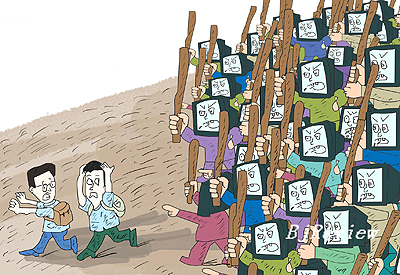
Anyone who still has doubts about the power of the Internet, listen up. In May, a video clip showing an elderly geography teacher being verbally abused by his students was posted on the Internet. It elicited immediate outrage among netizens. The location of the incident was quickly identified as the Haidian Art Vocational School in Beijing. As the ill feeling grew, netizens went about blocking the school's homepage, identifying the students involved, and eventually posting their addresses and telephone numbers online.
It was only after the students apologized publicly for their actions, that the public's fury subsided.
Ironically, the actions of those who had so relentlessly tracked down the students have now been brought into question and become a new controversy, with even more of an online backlash than the original incident.
Most Chinese netizens are familiar with the first time the Internet was used as an electronic dragnet to "capture" someone. On February 26, 2006, a dozen explicit pictures of a woman crushing a cat's skull with the heel of her shoe was widely circulated on the Internet. The images resulted in enraged netizens offering a reward of thousands of yuan to identify the cat murderer. Days later she was found. Information about her employer and her private details were soon circulating in chat rooms and bulletin boards. This led to endless real-life threats and attacks, her resignation from the job and her many public apologies. The incident is still a talking point.
Those who favor this type of public solidarity see it as a new way of public supervision, which encourages social responsibility and justice.
Yet, the method of "hunting online" can just as easily be abused and misused. An example is the case of the "Tong Xu" (Bronze Mustache) scandal. Last April, a stranger posted a statement on the Internet, saying that his wife had a one-night stand with a netizen called "Tong Xu." A group of "good Samaritan" netizens set about finding the "culprit" and posted his personal information online. Overwhelmed by anonymous calls and threats, "Tong Xu" fled. The man who had made the accusations then retracted it, saying that he had fabricated the whole story.
Psychologists noted that the majority of the netizens who participated in these and similar incidents did so to relieve pressure. These Internet attacks that offended the norms and morals are ways of venting for them. A handful of them even falsify incidents to gain fame or money by disturbing sensitive netizens and provoking anger.
By the end of 2006, Chinese netizens totaled 120 million. In a big virtual world made up of almost 800,000 websites and over 50 million computers, a disciplined network environment is imperative. Witch-hunts and discipline are often uneasy bedfellows.
Use legal means
Yang Gengshen (China Youth Daily): In a world where rule of law is supreme, law should judge anyone committing any crime. So should law then not also authorize investigation and punishment? Manhunts on the Internet are unreasonable and baseless. Groups of hidden web users are gathered to investigate so-called social illnesses and penalize those they believe are at fault. That may in fact substantially harm the rights and privacy of other people.
These unproved "crimes" and unofficial "judgments" could also breed Internet violence, which goes against the spirit of law. Meanwhile, it is worrisome for netizens to be provoked by vicious motives.
| 